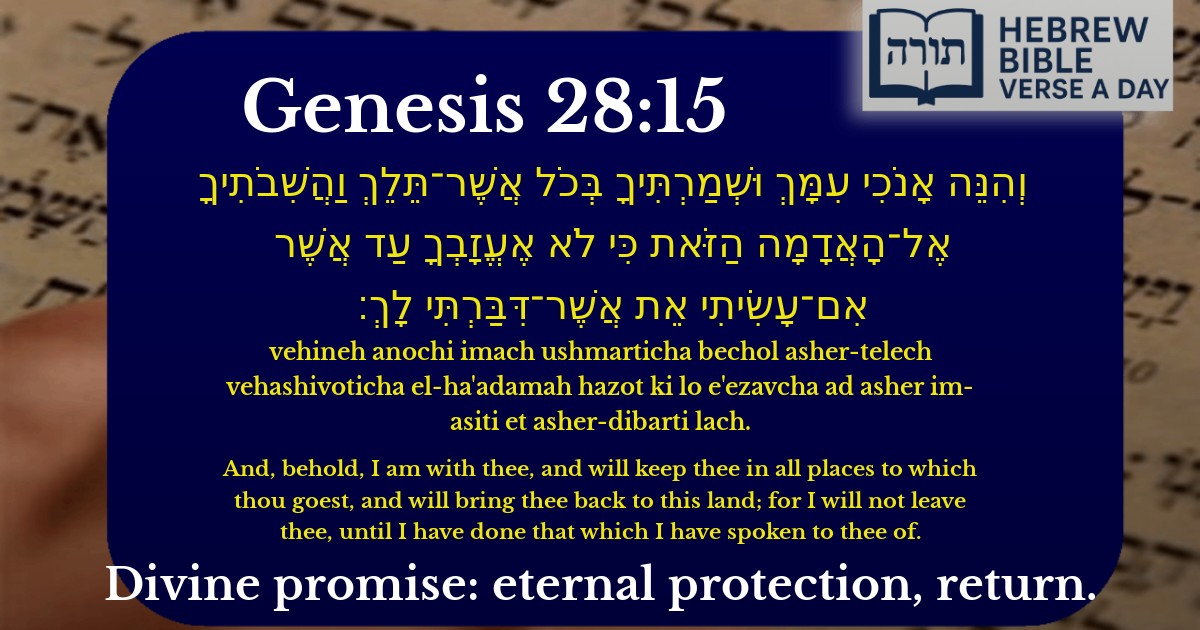Join Our Newsletter To Be Informed When New Videos Are Posted
Join the thousands of fellow Studends who rely on our videos to learn how to read the bible in Hebrew for free!
Hebrew Text
וְהִנֵּה אָנֹכִי עִמָּךְ וּשְׁמַרְתִּיךָ בְּכֹל אֲשֶׁר־תֵּלֵךְ וַהֲשִׁבֹתִיךָ אֶל־הָאֲדָמָה הַזֹּאת כִּי לֹא אֶעֱזָבְךָ עַד אֲשֶׁר אִם־עָשִׂיתִי אֵת אֲשֶׁר־דִּבַּרְתִּי לָךְ׃
English Translation
And, behold, I am with thee, and will keep thee in all places to which thou goest, and will bring thee back to this land; for I will not leave thee, until I have done that which I have spoken to thee of.
Transliteration
Vehineh anochi imach ushmarticha bechol asher-telech vehashivoticha el-ha'adamah hazot ki lo e'ezavcha ad asher im-asiti et asher-dibarti lach.
Hebrew Leining Text
וְהִנֵּ֨ה אָנֹכִ֜י עִמָּ֗ךְ וּשְׁמַרְתִּ֙יךָ֙ בְּכֹ֣ל אֲשֶׁר־תֵּלֵ֔ךְ וַהֲשִׁ֣בֹתִ֔יךָ אֶל־הָאֲדָמָ֖ה הַזֹּ֑את כִּ֚י לֹ֣א אֶֽעֱזׇבְךָ֔ עַ֚ד אֲשֶׁ֣ר אִם־עָשִׂ֔יתִי אֵ֥ת אֲשֶׁר־דִּבַּ֖רְתִּי לָֽךְ׃
וְהִנֵּ֨ה אָנֹכִ֜י עִמָּ֗ךְ וּשְׁמַרְתִּ֙יךָ֙ בְּכֹ֣ל אֲשֶׁר־תֵּלֵ֔ךְ וַהֲשִׁ֣בֹתִ֔יךָ אֶל־הָאֲדָמָ֖ה הַזֹּ֑את כִּ֚י לֹ֣א אֶֽעֱזׇבְךָ֔ עַ֚ד אֲשֶׁ֣ר אִם־עָשִׂ֔יתִי אֵ֥ת אֲשֶׁר־דִּבַּ֖רְתִּי לָֽךְ׃
🎵 Listen to leining
Parasha Commentary
📚 Talmud Citations
This verse is quoted in the Talmud.
📖 Chullin 91b
The verse is referenced in a discussion about divine protection and the promise made to Jacob.
📖 Berakhot 4b
The verse is cited in the context of discussing God's promises and protection for the righteous.


Context of the Verse
This verse (Bereshit 28:15) is part of Hashem's promise to Yaakov Avinu during his dream of the ladder at Beit El. Yaakov was fleeing from his brother Esav and heading toward Charan. The verse reassures Yaakov of divine protection and the fulfillment of the covenant made with Avraham and Yitzchak.
Rashi's Commentary
Rashi explains that the phrase "וְהִנֵּה אָנֹכִי עִמָּךְ" ("And, behold, I am with thee") is a promise that Hashem will protect Yaakov even outside Eretz Yisrael, despite the general principle that the Shechinah does not fully manifest outside the Land. This is an exceptional guarantee due to Yaakov's righteousness.
Regarding "וַהֲשִׁבֹתִיךָ אֶל־הָאֲדָמָה הַזֹּאת" ("and will bring thee back to this land"), Rashi notes that this promise was necessary because Yaakov feared he might die in exile like his grandfather Avraham (who was buried in Chevron) or his father Yitzchak (who never left Eretz Yisrael). Hashem assures him of his safe return.
Rambam's Perspective
In Moreh Nevuchim (1:18), Rambam interprets this verse as an example of divine providence (hashgacha pratit) granted to the righteous. Yaakov's unique spiritual stature warranted direct divine intervention in his travels and eventual return.
Talmudic and Midrashic Insights
Ibn Ezra's Linguistic Analysis
Ibn Ezra highlights the emphatic language of "כִּי לֹא אֶעֱזָבְךָ" ("for I will not leave thee"), noting the double negative (לֹא...עַד אֲשֶׁר אִם) as a rhetorical device to stress the absolute certainty of Hashem's promise.
Chassidic Interpretation (Sefat Emet)
The Sefat Emet teaches that Yaakov's journey symbolizes the soul's descent into physicality. Hashem's assurance signifies that divine light accompanies even the lowest spiritual states, ensuring ultimate elevation—a lesson for all Jews in exile.